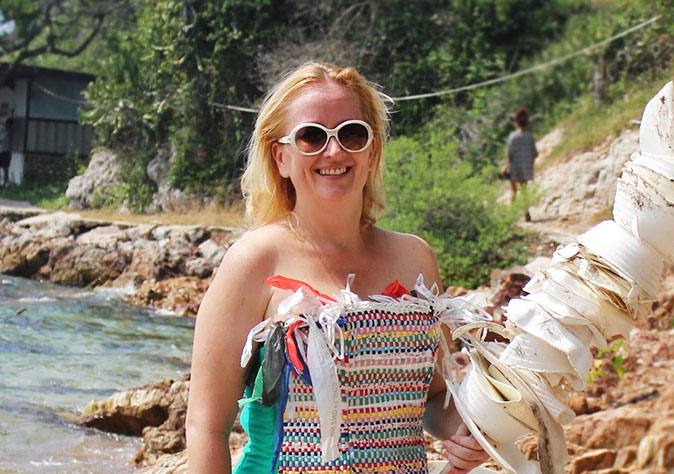Ever been surprised by the amount of trash left over from a quick trip to 7-Eleven for snacks? Or wondered why that bottle of milk needed to be double-bagged with three straws? Are you saddened by the piles of trash ruining Thailand’s idyllic beaches? Madeleine Recknagel has felt all of these things, and in 2015 she began to adopt a zero-waste lifestyle in Bangkok.

German expat Recknagel aims to live in a way that does not create trash and that’s not easy. The average Thai produces 1.1 kilograms of garbage each day. In 2009, the country generated 15.1 million tons of garbage, with Bangkokians responsible for 20 percent of that. By 2015, it was estimated that the figure was probably closer to 26.9 million tons.
When Recknagel discovered these statistics, she was shocked and began re-evaluating her life, wondering if it was possible to totally avoid creating any more garbage.
Inspiration also came from her childhood growing up in communist East Germany and how this contrasted with her early adult life in the United States. “Growing up behind the Iron Curtain, I owned one pair of jeans, living in the States I had 35,” she said.
Recknagel compared the excessive consumerism of the U.S. to her limited choices living in a communist country. She realized that buying and owning more, with all the disposable packaging this involves, was not making her happy.
Then, while on vacation on Koh Pha Ngan, Recknagel noticed the garbage surrounding her on the beaches and by the roadside. “This really opened my eyes and I was blown away by how wasteful I had become. I made a personal decision to rethink my habits,” she told Coconuts. Friends wondered whether she had gone mad.

Habits Changed
Since having these revelations, Recknagel has completely changed her daily routines and proven that living a nearly zero-waste lifestyle is possible in Bangkok.
It is a nearly zero-waste lifestyle, she emphasizes. Bangkok does not have the bulk shopping, recycling, community gardens and other projects that make this more achievable in places like Berlin or Brooklyn.
“Here, it’s a journey, a learning process to get as close to being waste-free as possible,” Recknagel explained. Her seven-point mantra of rethink, refuse, reduce, reuse, repair, recycle, and rot helps her step out of today’s throwaway society.
Learning to Eat
Recknagel’s first goal was to think about how to feed herself without creating the torrents of plastic and styrofoam garbage created when the average Bangkokian eats. “Easily recycled packaging, such as glass or paper, is allowed, but the best method is to avoid food packaging altogether,” she said.

The trash activist rarely visits supermarkets, but uses traditional shops, stalls and farmers’ markets instead. “Every six months, I travel to Chinatown to buy rice, grains and nuts in bulk, which means less packaging. I carry my reusable bags and small cotton baggies with me everywhere so I never have to use a plastic bag. A reusable water bottle refilled at home is essential too.”

When eating on-the-go, Recknagel attracts strange looks as she pulls out her cutlery set: a pair of wooden chopsticks, matching fork and spoon, and most astonishingly, a glass drinking straw. She uses glass jars and an old-fashioned, multi-tiered tiffin box for takeaway food.
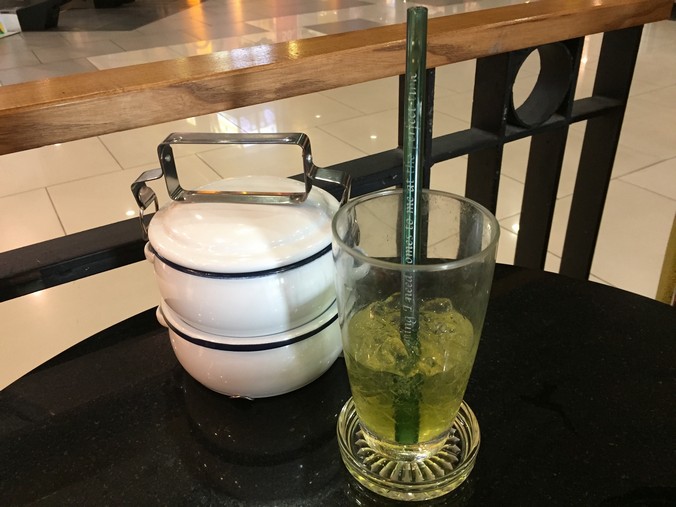
“Street vendors often look confused and laugh at me. They are always good natured and obliging, but even those who know me automatically grab a plastic bag or box in case I’ve forgotten to bring my own,” said Recknagel.
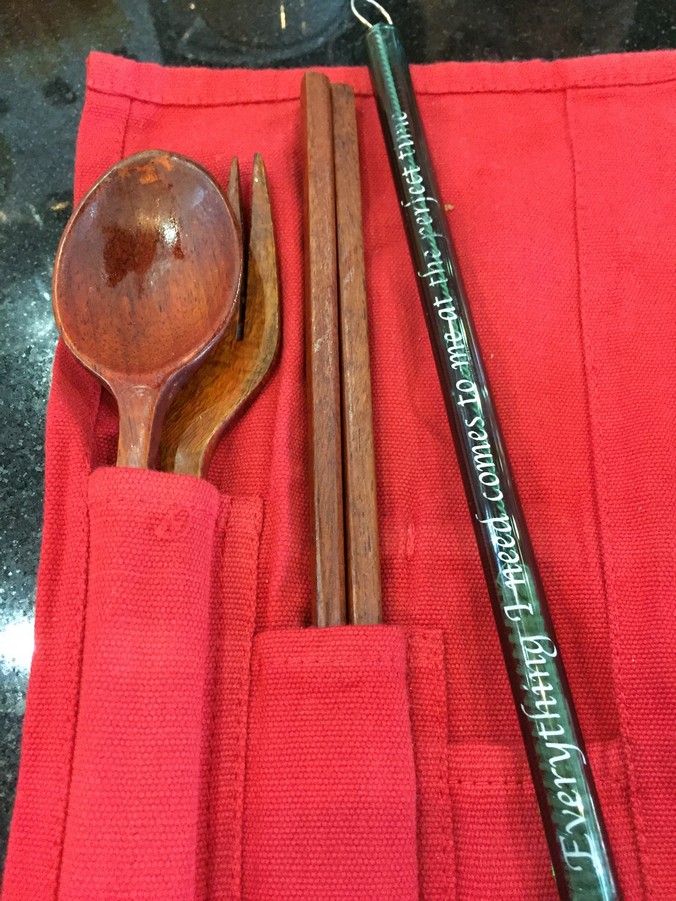
Her habits also extend to composting leftover food on the balcony of her condo. ‘I’m vegetarian and don’t eat dairy, which is why there’s no smell as the stuff rots. No flies come because I keep it covered with fresh soil,” she said of her compost heap. Aside from the usual fruit and vegetable peels, all kinds of things are added: newspapers, cardboard egg cartons, coffee grounds and even toenail clippings are part of her pile. The end result is fertile soil for growing plants.
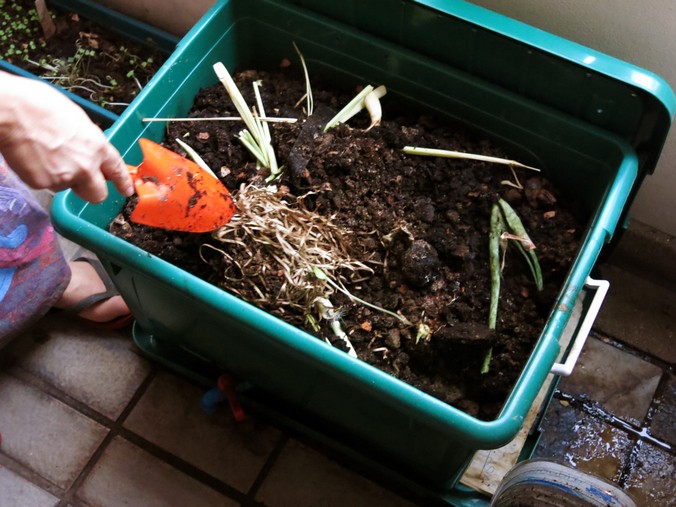
Healthy Housework
We also wanted to know how it’s possible to keep an apartment clean without resorting to disposable packaged products. Recknagel’s reply was, “Soapnuts!” These are berries from the Sapindus shrub, which grows in Asia and is related to the lychee tree. “You boil them in water, they foam up, smell nice, are chemical-free and can go into the washing machine or be used to do the dishes,” she explained.
With internet research, Recknagel has revitalized traditional recipes from the past for other types of cleaning. By making her own lime-scented vinegar, she has a cleaner for floors and surfaces and she uses black tea and newspapers for washing windows.
Beauty Regime
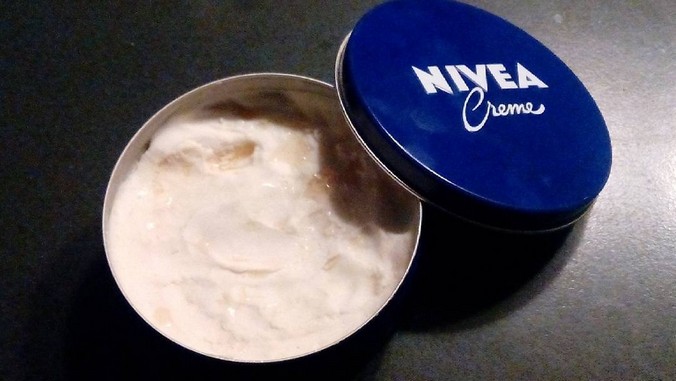
Recknagel admits to committing lots of plastic waste crimes in the past — many in the name of beauty. To compensate, she has created a plastic-free bathroom. Bars of soap wrapped in paper from local markets have replaced single-use plastic bottles containing shower gels and shampoos. Curbing wastage even further, Recknagel is not afraid to go makeup-free.
“I also began to make my own everyday products, like toothpaste and deodorant, which I make out of baking soda, coconut oil and cornstarch scented with essential oils. I add beeswax to make a solid version for hubby,” she said.
Recknagel is particularly proud of her homemade body lotion containing chamomile tea, beeswax, coconut and essential oils. “It looks like the real thing, in up-cycled Nivea pots, and my friends love it!” she said.
Saving Time
When asked whether her lifestyle is excessively time consuming, Recknagel responded that she actually saves time. “I spend less time shopping because I bulk buy essentials. I store these at home and combine them to make my beauty and cleaning products. Rethinking what I actually need has meant I shop less and don’t waste time in malls.” This also means less time spent traveling to and from the shops as well as wandering the supermarket aisles.
Recknagel admits she still has challenges to becoming 100 percent zero-waste. For example, she loves rice noodles but hasn’t been able to source them without plastic packaging.
However, she is determined to keep going and is passionate about sharing her habits with others in order to benefit the planet.
If you are interested in trying it for yourself, here are five tips from Recknagel to get you started:
- Cut out water bottles by signing up for water delivery service, which reuses the barrels. Or use a nearby water vending machine.
- Never leave home without a full refillable bottle of water.
- Think about food packaging: take a container to your street food vendor, it may raise a smile, but it saves them money too!
- Don’t buy things that are over-packaged. Say no to all plastic extras. Leave bags, straws and cutlery in the store.
- Begin to rethink your daily habits and routines: What can you change? What can you do without?
Want to know more? Check out her blog ‘The Sustainable Self’ or Facebook page of the same name, where she shares ideas and gives pointers to help you reduce waste. She’ll also be speaking next month at Wonderfruit festival, where she’ll give advice about how to start removing plastic from your life.
